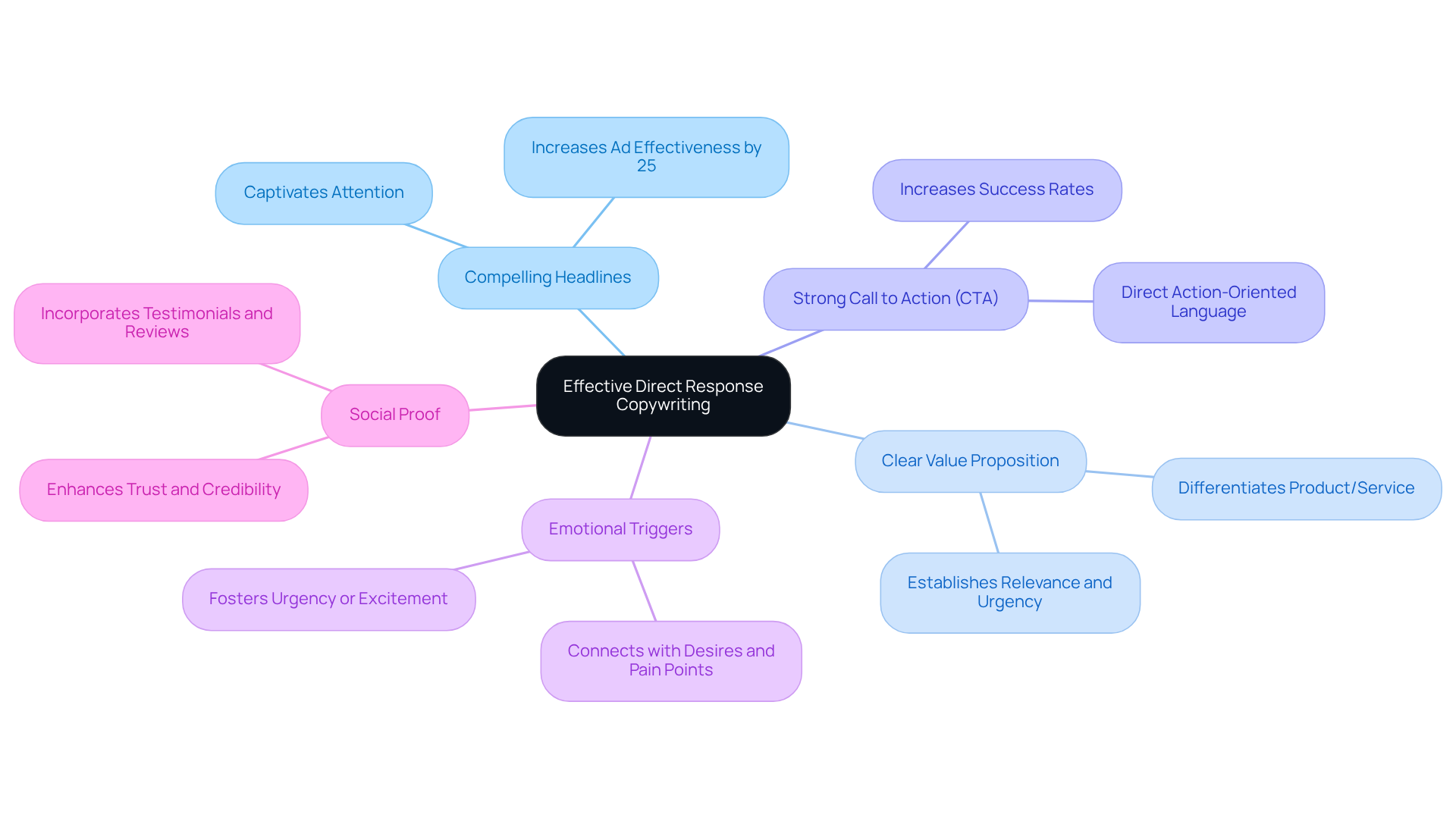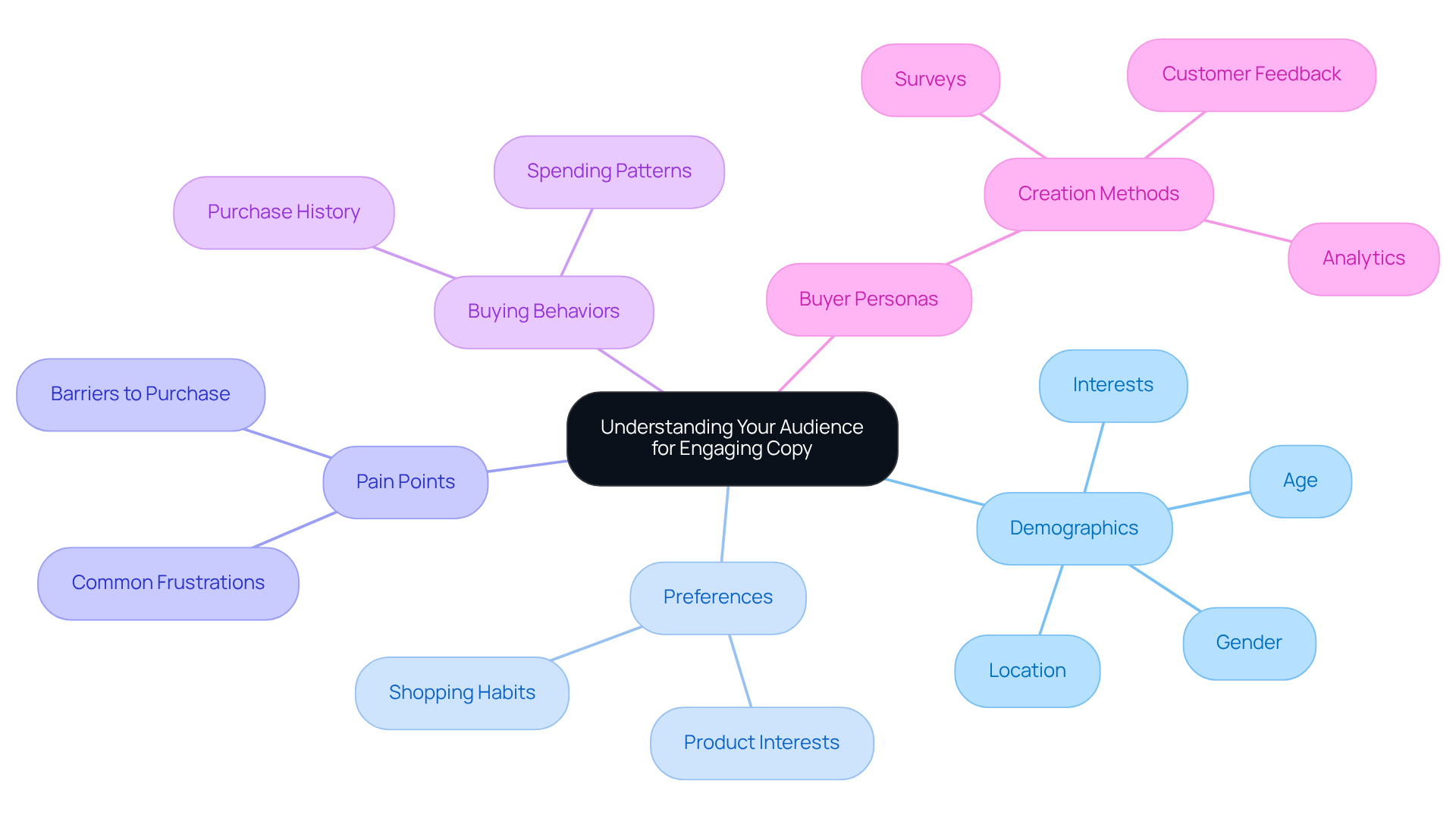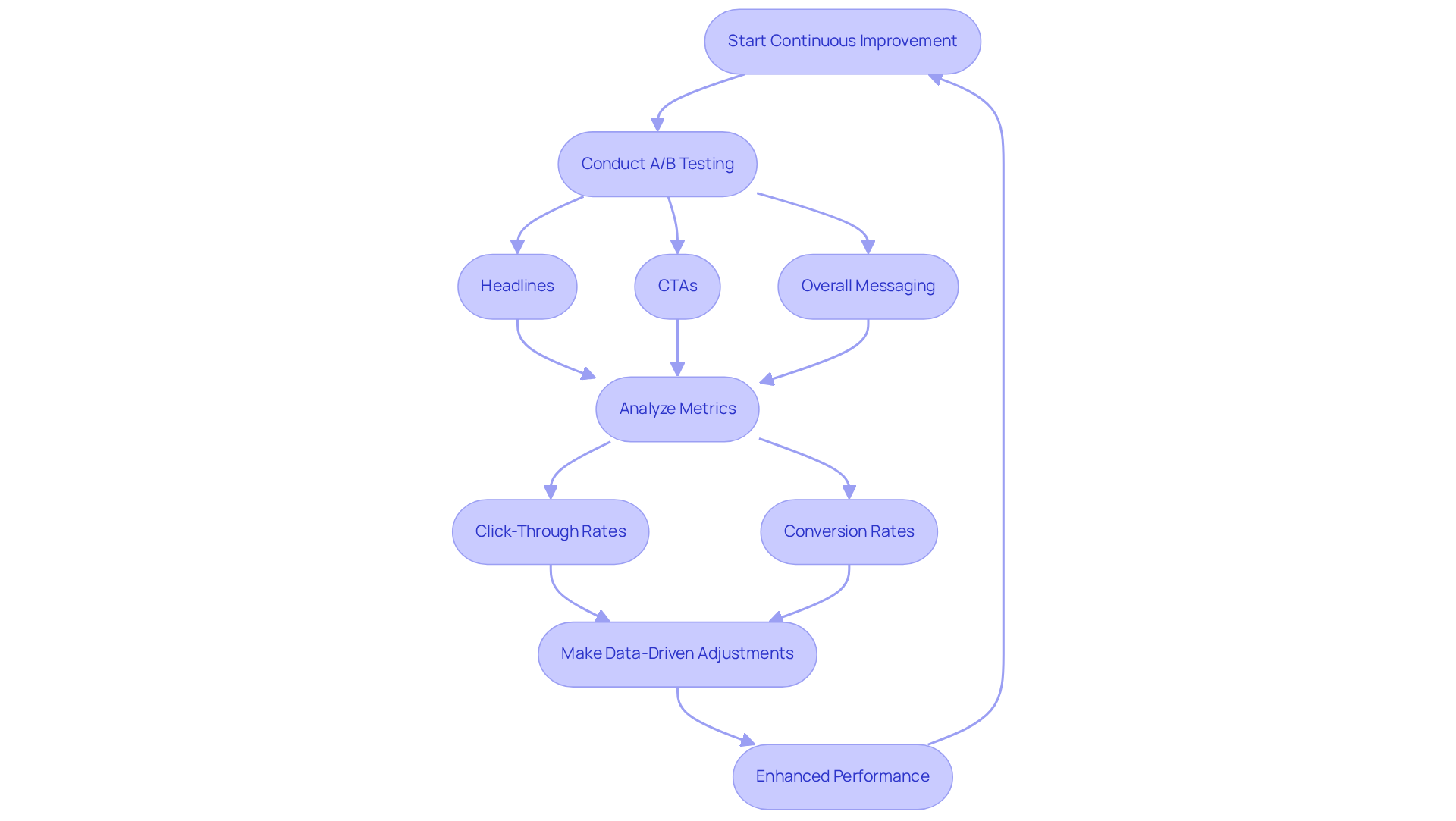
Overview
Direct response copywriting is indispensable for direct-to-consumer (DTC) brands. It is meticulously crafted to incite immediate actions from potential customers, thereby exerting a direct influence on sales and revenue. Effective direct response copywriting integrates essential elements:
- Compelling headlines
- Clear value propositions
- Strong calls to action
- Emotional triggers
- Social proof
Each of these components plays a pivotal role in engaging the target audience and driving conversions. By understanding and implementing these key strategies, brands can significantly enhance their marketing effectiveness.
Introduction
In a landscape where consumer attention is fleeting, the art of direct response copywriting emerges as a vital tool for direct-to-consumer (DTC) brands. This technique is essential for driving immediate action and achieving measurable results. Not only does it enhance sales performance, but it also fosters lasting customer relationships through targeted messaging. However, as brands strive to master this skill, they often grapple with the complexities of audience engagement and the need for continuous optimization.
What are the key strategies that can transform ordinary copy into a powerful catalyst for conversion?
Define Direct Response Copywriting and Its Importance for DTC Brands
Copywriting direct response represents a targeted writing style designed to elicit immediate actions from readers, such as making a purchase, subscribing to a newsletter, or clicking a link. Unlike conventional copywriting, which often emphasizes storytelling and brand awareness, copywriting direct response focuses on and measurable outcomes. This approach is particularly crucial for direct-to-consumer (DTC) companies, as it has a direct impact on sales performance and revenue generation.
Parah Group's proven strategies in Rate Optimization (CRO) have yielded significant results, including:
- A 35% increase in conversion rates
- A 10% rise in revenue per visitor for clients
By crafting persuasive messages that resonate with their audience, brands can effectively enhance sales and foster customer loyalty. Therefore, copywriting direct response serves as a cornerstone of successful marketing strategies, driving tangible results and nurturing long-term relationships with consumers. This is especially true when supported by expert CRO agencies like Parah Group, which prioritize sustainable profitability and growth.

Identify Key Elements of Effective Direct Response Copywriting
Effective copywriting direct response hinges on several essential elements.
- Compelling Headlines serve as the initial touchpoint; they must captivate attention while succinctly conveying the core message. Research indicates that a can enhance online ad effectiveness by up to 25%, underscoring its significance.
- Clear Value Proposition is crucial; it articulates what differentiates the product or service and why it matters to the reader. This clarity establishes both relevance and urgency.
- Strong Call to Action (CTA) employs direct, action-oriented language to instruct the reader on the next steps, such as 'Buy Now' or 'Sign Up Today.' A well-crafted CTA can significantly impact success rates.
- Emotional Triggers should be utilized to connect with people's desires and pain points, fostering a sense of urgency or excitement. Joe Sugarman aptly likened engaging copy to a slippery slide, guiding prospects smoothly toward action.
- Finally, Social Proof is vital; incorporating testimonials, reviews, or case studies enhances trust and credibility, reassuring potential customers of the product's value and effectiveness.
By weaving these components into their messaging, DTC companies can leverage copywriting direct response to create persuasive narratives that effectively drive conversions.

Understand Your Audience to Tailor Compelling Copy
To produce engaging copywriting direct response content, companies must first grasp the intricacies of their target market. This necessitates thorough research to pinpoint demographics, preferences, pain points, and buying behaviors. Developing detailed buyer personas is crucial in crafting messages that resonate with the needs of the target audience.
Furthermore, leveraging tools such as surveys, customer feedback, and analytics yields invaluable insights into what truly engages the market. By tailoring content to specific consumer segments, DTC companies can enhance interaction and significantly increase the likelihood of successful sales using copywriting direct response.
At Parah Group, we underscore the importance of this foundational understanding as a core component of our Conversion Rate Optimization (CRO) strategy. Our proven methodologies, evidenced by successful case studies, illustrate that when companies align their messaging with audience insights, they can substantially drive revenue growth and bolster profitability.
For instance, our collaboration with a $30M apparel company resulted in a remarkable 35% increase in conversion rates by optimizing their website to better reflect customer needs and preferences. This transformational approach not only elevates engagement but also ensures for DTC companies.

Implement Testing and Optimization Strategies for Continuous Improvement
Continuous improvement is not just beneficial but essential for effective copywriting direct response. A/B testing serves as a powerful tool, enabling companies to assess various copy elements, including headlines, calls-to-action (CTAs), and overall messaging. This evaluation is crucial for identifying the most effective components. By examining key metrics such as click-through rates, conversion figures, and customer feedback, brands gain invaluable insights into audience preferences and engagement patterns.
To thrive in a competitive market, brands must adopt a mindset of iteration, making data-driven adjustments to their copy to enhance performance. Embracing a culture of testing and optimization allows DTC brands to maintain the effectiveness and relevance of their messaging. Ultimately, this commitment can lead to , positioning the brand advantageously in a crowded landscape.
In summary, continuous improvement through A/B testing and metrics analysis is not merely an option; it is a necessity for brands aiming to refine their copywriting direct response and drive results. By fostering an environment that prioritizes data-driven decision-making, companies can ensure their copy resonates with their target audience, paving the way for sustained success.

Conclusion
Mastering direct response copywriting is not just beneficial but essential for the success of direct-to-consumer (DTC) brands. This approach focuses on generating immediate actions from potential customers, driving sales while simultaneously fostering lasting relationships through clear calls to action and measurable outcomes. By prioritizing this targeted methodology, DTC brands can significantly enhance their marketing effectiveness and overall revenue.
Key elements of effective direct response copywriting are paramount, including:
- Compelling headlines
- Clear value propositions
- Strong calls to action
- Emotional triggers
- Social proof
Understanding the audience through detailed research and buyer personas is crucial for crafting messages that resonate. Furthermore, the necessity of continuous testing and optimization cannot be overstated; employing A/B testing to refine copy ensures it remains relevant and impactful.
Ultimately, the significance of direct response copywriting for DTC brands is profound. By adopting these strategies and committing to understanding their audience, brands can achieve sustainable growth and profitability. Companies are urged to embrace a culture of iteration and data-driven decision-making, ensuring their messaging not only captures attention but also converts interest into action.
Frequently Asked Questions
What is direct response copywriting?
Direct response copywriting is a targeted writing style designed to elicit immediate actions from readers, such as making a purchase, subscribing to a newsletter, or clicking a link.
How does direct response copywriting differ from conventional copywriting?
Unlike conventional copywriting, which often emphasizes storytelling and brand awareness, direct response copywriting focuses on clear calls to action and measurable outcomes.
Why is direct response copywriting important for DTC brands?
Direct response copywriting is crucial for direct-to-consumer (DTC) companies as it has a direct impact on sales performance and revenue generation.
What results have been achieved using strategies from Parah Group?
Parah Group's strategies in Rate Optimization (CRO) have yielded significant results, including a 35% increase in conversion rates and a 10% rise in revenue per visitor for clients.
How can brands enhance sales through copywriting?
By crafting persuasive messages that resonate with their audience, brands can effectively enhance sales and foster customer loyalty.
What role do expert CRO agencies play in direct response copywriting?
Expert CRO agencies like Parah Group prioritize sustainable profitability and growth, supporting brands in implementing effective direct response copywriting strategies.
FAQs











